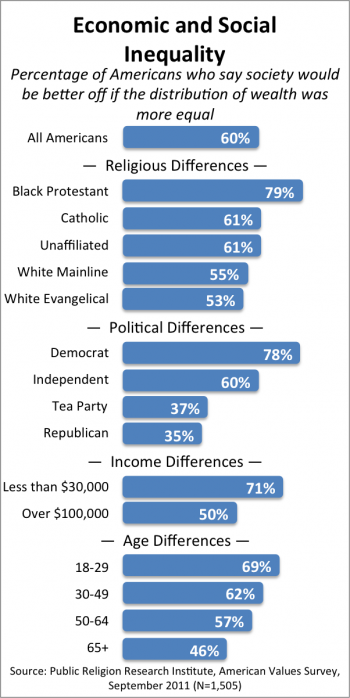 The new "2011 American Values Survey" released this morning by the Public Religion Research Institute includes fascinating findings about the role of religion in the 2012 presidential race, the "Mormon question," and issues that go to the heart of the Occupy Wall Street movement.
The new "2011 American Values Survey" released this morning by the Public Religion Research Institute includes fascinating findings about the role of religion in the 2012 presidential race, the "Mormon question," and issues that go to the heart of the Occupy Wall Street movement.
When it comes to the role of faith in the 2012 Presidential Election, the survey found that:
- Two-thirds of voters say that it is very important (39 percent) or somewhat important (28 percent) for a presidential candidate to have strong religious beliefs.
- A majority of voters (53 percent) report that they would be somewhat or very comfortable with a Mormon serving as President, although more than 4-in-10 (42 percent) say that a Mormon president would make them somewhat or very uncomfortable.
Significantly more Democratic voters (50 percent) report feeling at least somewhat uncomfortable with a Mormon serving as president than Republican voters (36 percent) or Independent voters (38 percent).
Millennial voters (age 18-29) are less comfortable than senior voters (age 65 and over) with a Mormon serving as president. A majority (54 percent) of Millennial voters say they would be at least somewhat uncomfortable with a Mormon serving as president, compared to less than 4-in-10 (39 percent) of senior voters.
Thirty-six percent of registered voters do not believe the Mormon faith is a Christian religion, compared to half of registered voters who say that the Mormon faith is a Christian religion; 14 percent say they are not sure.
Nearly half (49 percent) of white evangelical Protestant voters do not believe that the Mormon faith is a Christian religion.
Approximately two-thirds (66 percent) of voters say that the religious beliefs of Mormons are somewhat or very different from their own.
Only about 4-in-10 (42 percent) Americans can correctly identify Mitt Romney’s religion as Mormon.
Among voters who believe that Mormons have religious beliefs that are somewhat or very similar to their own and are familiar with Romney, nearly two-thirds (66 percent) have a favorable view of him. In contrast, among voters who believe that Mormons have religious beliefs that are somewhat or very different from their own, less than half (47 percent) report having a favorable opinion of Romney.
“Despite the considerable attention paid to Romney’s Mormon faith, most Americans are still unaware of his religious identity, with one important exception: white evangelical Protestants have become significantly better informed about Romney’s faith since mid-summer,” said Daniel Cox, PRRI research director. “Within this period, Romney’s favorability among white evangelical Protestants has fallen significantly, from 63 percent in late September to just 49 percent currently.”
On issues of the economy, the survey found that:
A majority (53 percent) of Americans believe that one of the biggest problems in the country is that everyone does not have an equal chance in life. Four-in-ten Americans say that it is not really that big a problem if some people have more of a chance than others.
Seven-in-ten Democrats believe that one of the biggest problems in the country is that everyone does not have an equal chance in life, while less than 4-in-10 Republicans (38 percent) and Tea Party members (37 percent) agree. The views of Independents closely track with the general public.
White evangelical Protestants and white mainline Protestants are evenly divided, but a majority of Catholics (54 percent), the religiously unaffiliated (52 percent), and non-Christian affiliated Americans (54 percent), and fully 82 percent of black Protestants believe that one of the biggest problems in the country is that not everyone has an equal chance in life.
A strong majority (60 percent) of Americans agree that the country would be better off if the distribution of wealth was more equal, while 39 percent disagree.
Strong majorities of Democrats (78 percent) and Independents (60 percent) agree that the country would be better off if the wealth was more evenly divided. In stark contrast, more than 6-in-10 (63 percent) Republicans and Americans who identify with the Tea Party movement (62 percent) disagree.
Majorities of every major religious group and religiously unaffiliated Americans agree that the country would be better off if the distribution of wealth was more equal.
Nearly 7-in-10 (69 percent) Millennials agree that the U.S. would be better off if there was a more equal distribution of wealth. Among seniors, less than half (46 percent) agree.
Seven-in-ten (70 percent) Americans favor “the Buffett rule,” a proposal to increase the tax rate on Americans earning more than $1 million per year, compared to only 27 percent who oppose it.
Overall, two-thirds (67 percent) of Americans favor increasing the minimum wage from $7.25 an hour to $10.00 an hour.
Robert P. Jones, CEO of the Public Religion Research Institute, said the survey's findings point to a division in the American public along generational as well as political and ideological or religious lines.
“We are witnessing the emergence of a generational fault line over what constitutes a good society,” Jones said. “Seven-in-ten of the Millennial generation believe that society would be better off if the distribution of wealth were more equal, while a majority of seniors disagree.”
The survey results were based on telephone interviews with more than 1,500 American adults between Sept. 22 and Oct. 2, 2011.
To read the "American Values Survey" in its entirety, click HERE.
Cathleen Falsani is Web Editor and Director of New Media for Sojourners. Her latest book, BELIEBER!: Fame, Faith and the Heart of Justin Bieber, was released last month. Follow Cathleen on Twitter @GodGrrl.
Got something to say about what you're reading? We value your feedback!